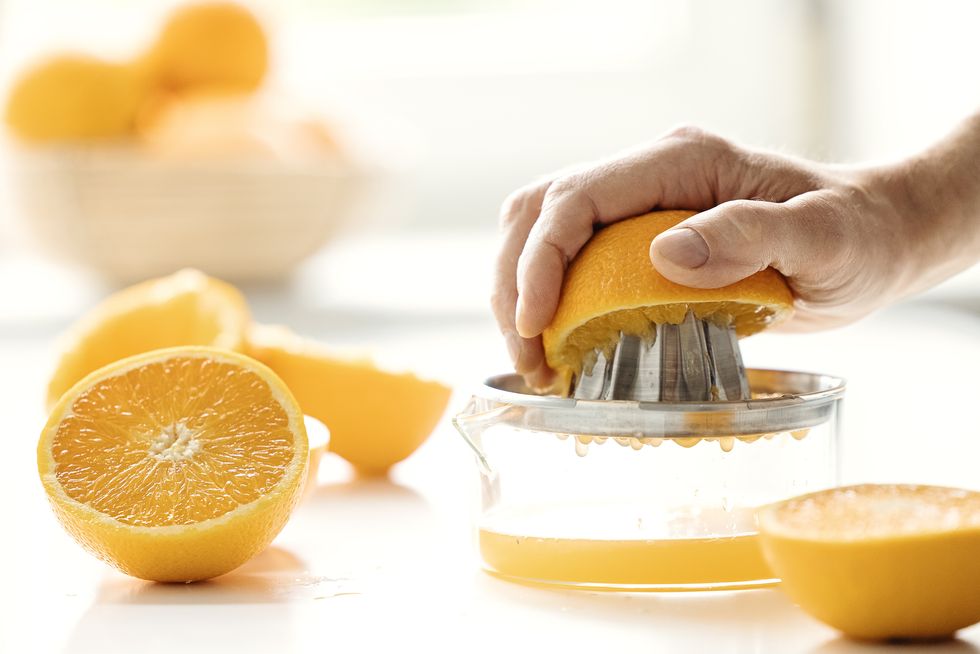There’s a reason we pour a glass of orange juice in the morning or grab a bottle if we’re feeling under the weather. It’s made from oranges, which are full of vitamin C. Vitamin C supports the immune system, so it has become known to many as “healthy.” But just how healthy is it to drink orange juice every day?
We wanted to know all the facts about starting your day with a glass of OJ, so we got in touch with Lauren Manaker, R.D.N., and Dr. Raj Dasgupta, Chief Medical Advisor for Garage Gym Reviews. The bottom line? It’s complicated.
“Orange juice does have some great perks—like being packed with vitamin C and antioxidants—but drinking it every day isn’t always the best idea,” Dr. Dasgupta says.
The Health Benefits Of Orange Juice
“Orange juice is the darling of the immune health-supporting drinks, thanks to the vitamin C it provides,” Manaker says. “But OJ is so much more than a vessel for this key nutrient.”
Other key nutrients in orange juice are folate and thiamin. Some OJs are also fortified with vitamin D and calcium, which Manaker says might support bone health.
“Since most Americans are not eating the recommended servings of fruits and veggies every day, OJ can help bridge the gap in an accessible and versatile way,” she adds. So that’s good news if you’re an orange juice drinker.
The Potential Risks Of Orange Juice
Here’s the thing, though: Orange juice contains a lot of sugar. According to the USDA, an average 8-ounce serving has about 26 grams of carbohydrates and 20 grams of sugar.
Juicing strips fruit of much of its fiber. A cup of orange juice has zero protein, fiber, or fat, which are nutrients that can help slow the absorption of sugar and prevent blood sugar spikes.
“It’s easy to forget how much sugar is in even a small glass, and without the fiber you’d get from eating an orange, it can spike your blood sugar quickly,” Dr. Dasgupta says.
And according to Manaker, even natural sugars can contribute to increased caloric intake and potential weight gain if consumed in excess.
And due to its acidity, orange juice could make symptoms worse for anyone with acid reflux or gastritis. She also says people with diabetes or who are managing PCOS might experience elevated blood sugar when drinking orange juice by itself.
“For this population, drinking orange juice as they are enjoying a meal or snack that provides protein, fiber, and fat may be a better bet, assuming their healthcare provider approves of them drinking fruit juice,” Manaker says.
Pasteurized Vs. Unpasteurized Orange Juice
There are also some food safety things to keep in mind when choosing your juice. Unpasteurized OJ is often favored for its fresh taste, but it comes with an increased risk of contamination from bacteria, Manaker says. Pasteurized orange juice undergoes a heat treatment that kills harmful bacteria, but some of the nutritional value and flavors can be lost in the process.
Pasteurized orange juice has a longer shelf life, so if you decide to purchase unpasteurized juice, she said you should drink it shortly after it’s made.
“And if you are making it at home, wash the outside of the orange before squeezing to help remove any bacteria that may be on the surface.”
The Bottom Line
So, is it healthy to drink orange juice every day? This depends on several factors, such as your diet and health history.
“There are a few reasons someone might want to skip orange juice,” Dr. Dasgupta says. “If you’re watching your blood sugar, trying to cut back on sugar, or have acid reflux, it might do more harm than good.”
“If a person is relatively healthy and they are not eating enough servings of fruit every day (as most Americans are not), then a glass of OJ every day may be a good idea,” Manaker says. “Just be mindful of serving sizes when drinking your juice!”

As a Contributing Writer, and former Associate Editor, at Delish, Allie is a writer, reporter, and producer of features at the intersection of food and culture. Before Delish, Allie worked for publications including Apartment Therapy and Insider. She even spent time working in restaurants and breweries. Allie has dumpster-dived in NYC to expose food waste, reported on the invasive lionfish you can eat, and wrote about the growing trend of weed weddings. Her health and nutrition stories on hydration culture, bananas, and coffee have generated nearly 2M combined views. She loves traveling, running, and eating her way through new places and even has a thorough Google Maps ranking system for her favorite restaurants and bars! When not writing about food, she’s planning her next trip, lifting weights, or training for a race. Expertise: food & culture (Sustainability, Health, Travel) Education: M.S. in Journalism from Columbia University, B.S. in Information Science (User Experience Design) from the University of Michigan


